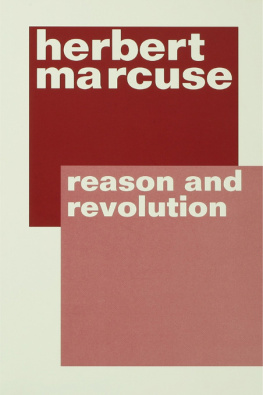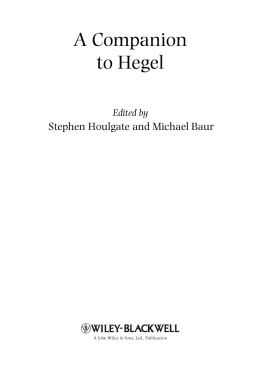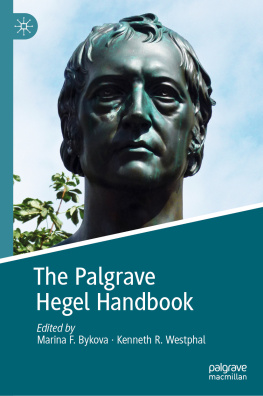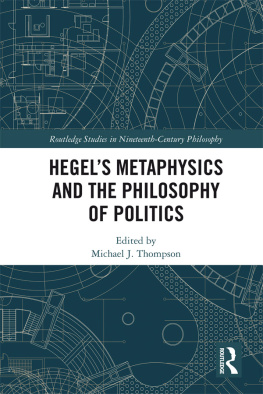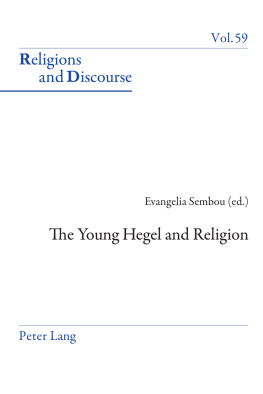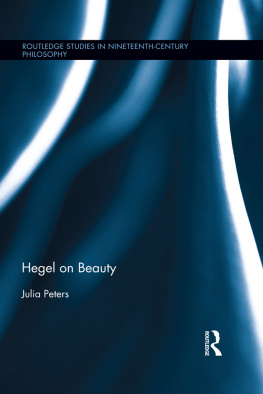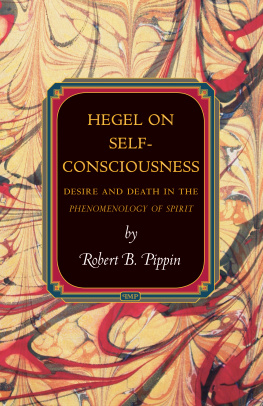Hegel

An Intellectual Biography
Horst Althaus
Translated by Michael Tarsh
Polity Press
English translation Polity Press 2000
First published in Germany as Hegel und die heroischen Jahre der Philosophie
Carl Hanser Verlag 1992.
This translation published in 2000 by Polity Press in association with Blackwell Publishers Ltd.
Editorial office:
Polity Press
65 Bridge Street
Cambridge CB2 1UR, UK
Marketing and production:
Blackwell Publishers Ltd
108 Cowley Road
Oxford OX4 1JF, UK
Published in the USA by
Blackwell Publishers Inc.
Commerce Place
350 Main Street
Malden, MA 02148, USA
All rights reserved. Except for the quotation of short passages for the purposes of criticism and review, no part of this publication may be reproduced, stored in a retrieval system, or transmitted, in any form or by any means, electronic, mechanical, photocopying, recording or otherwise, without the prior permission of the publisher.
Except in the United States of America, this book is sold subject to the condition that it shall not, by way of trade or otherwise, be lent, resold, hired out, or otherwise circulated without the publishers prior consent in any form of binding or cover other than that in which it is published and without a similar condition including this condition being imposed on the subsequent purchaser.
ISBN 0-7456-1781-6
ISBN 978-0-7456-8338-6 (ebook)
A catalogue record for this book is available from the British Library and has been applied for from the Library of Congress.
Typeset in 10 on 12 pt Sabon
by Ace Filmsetting Ltd, Frome, Somerset
Printed in Great Britain by MPG Books, Bodmin, Cornwall
This book is printed on acid-free paper.
Contents

Translators Note

The following text is an abridged version of the German original, particularly with regard to material likely to be of more direct interest to a German audience. The abridgements were made in agreement with the author and the German publisher. The bibliography has been developed and extended in relation to English-language translations and publications.
1
Origins

When Hegel was born in Stuttgart on 27 August 1770 the very landscape of the place seems already to have left a powerful mark upon the character that would subsequently emerge. Hegel was born a native of Wrttemberg, and always continued even in later years as a salaried official of the Prussian state to consider himself as a Wrttembergian.
According to family tradition the Hegels were descended from immigrants from the Steiermark or Krnten region, persecuted Protestants who had sought protection in Wrttemberg in the middle of the sixteenth century. One of these immigrants was a Johann Hegel, potter by profession, who had settled in Grossbottwar in the Neckar region and eventually managed to become mayor of this little town. His numerous descendants in Wrttemberg included the Pastor Hegel who baptized Friedrich Schiller and the philosophers father, Georg Ludwig Hegel, ducal secretary and later counsellor of state. The philosophers grandfather had been chief intendant in Altensteig in the Black Forest, whilst his mother, Maria Magdalena, came from an old Stuttgart family of the seventeenth century which had spawned theologians, lawyers and officials, and which could be traced back on the maternal side to the Wrttemberg reformer Johannes Brenz.
For a young man with the family background that Hegel possessed and the interests that he would later develop, Wrttemberg in the latter half of the eighteenth century was an extremely auspicious place in which to be born. Alongside Saxony and the Saxon-Thuringian principalities, the state of Wrttemberg could boast the most developed educational system in the Holy Roman Empire of the German Nation. Prussia at the time still lagged far behind in this respect, and the only teachers it could call upon in any abundance were retired soldiers and war-wounded veterans who were very poorly remunerated for their educational services.
The exemplary educational institutions were all to be found in Saxony and Wrttemberg. Saxony could draw on schools in Meissen, Grimma and Schulpforta to supply its future state officials and civil servants, and especially the clerics and high-school teachers whom the country constantly required, and the philologists who, having read their Homer and developed an elegant Latin style, would leave their institutes of learning feeling properly equipped for any post or task. There was a highly developed system of financial assistance available which was administered in accordance with two essential criteria for selection of candidates: the steadfast faith and appropriate behaviour of a good Lutheran Christian, and the grammatical mastery of the classical languages. If things were in good order here, then it was felt that everything else could be left to take care of itself.
In Hegels time the Swabians of Wrttemberg represented the only Protestant German community south of the river Main which occupied a self-enclosed territory with jurisdiction of its own, and that since 1565, the year in which, after protracted sectarian conflicts, the State Assembly irrevocably declared the Lutheranism of the Augsburg Confession as the sole official religion of state. In this respect the Wrttemberg Swabians clearly distinguished themselves from the Swabians who still occupied ancient Habsburg territory under remarkable arrangements and structures of political rule which, dissociated from one another as they largely were, never succeeded in developing into any cultural or political unity. So-called Austrian Swabia, together with Vorarlberg and Breisgau, formed part of lower Austria and was governed until 1752 from Innsbruck, and subsequently from Freiburg. The region in question, with its various flatlands on the upper Danube as well as in the north, belonged amongst the outlying territories of the Habsburg crown, although it also boasted a number of Free Cities and principalities. But under the rule of Karl Eugen the idea of Swabia came increasingly to be identified with Wrttemberg because the dukedom, with its approximately 500,000 inhabitants, constituted a strong centralized state in marked contrast to the scattered Swabian settlements beyond its borders with their largely Catholic populations. On the one hand an absolutist regime of an eighteenth-century monarch with leanings towards the Enlightenment and a centralized, pragmatic and secularized system of public administration, and on the other an antiquated expression of Imperial rule with strong feudal remnants that tamely resisted the state and its all-powerful monarchy. What the categories of state, monarchy and feudalism effectively signified as political and historical factors at this time can be most fruitfully studied in relation to Swabia, where these forms all coexisted with one another, variously in cooperation or conflict as the case might be. In addition Wrttemberg was characterized by the presence of a state church which since the Reformation had continued to exercise its undiminished influence, through all other political changes, and which still closely controlled the lives of its subjects from the cradle to the grave.
Wrttemberg is a country rich in towns, but, with the exception of the princely residences of Stuttgart and Ludwigsburg, there is little real separation between town and country as such. The countryside effectively begins in the towns and penetrates deep within them, its plots and allotments already forming part of the latter, its rows of houses incorporating stables for cattle and store-rooms for agricultural equipment used out in the fields beyond the town. Even in 1849 Friedrich Theodor Vischer could describe Tbingen as a rather dirty and desolate little village where cows were still being driven through the narrow streets. Stutttgart is not like Dresden any more than Lessing is like Schiller, and even less like Leipzig which already appeared to Goethe, even before Hegel was born, as a little Paris. None the less, the princely residence of Stuttgart and its roughly twenty thousand inhabitants was a comfortable and attractive place, with its parks, gardens, promenades and businesses, with its stores and shops serving the demands of court, and formed a striking contrast with the surrounding countryside. The area around the New Palace, the English Garden which faces towards Cannstatt, the neatly regular streets in the suburbs and the Residential Palace in Ludwigsburg, all these are classical expressions of the eighteenth century.
Next page

